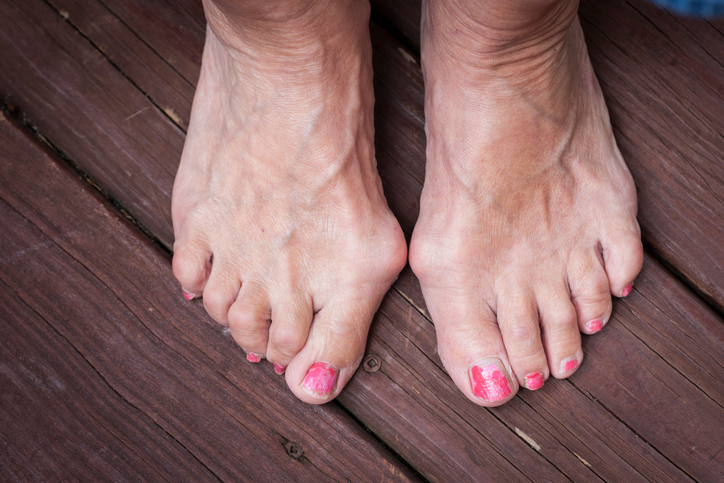Services - Single
Bunions
Symptoms, Causes and Treatment
Symptoms
Bunions may or may not cause symptoms. A frequent symptom is pain in the involved area when walking or wearing shoes that is relieved by resting. A bunion causes enlargement of the base of the big toe and is usually associated with positioning of the big toe toward the smaller toes. This leads to intermittent or chronic pain at the base of the big toe. Bunions that cause marked pain are often associated with swelling of the soft tissues, redness, and local tenderness. The common bunion is a localized area of enlargement of the inner portion of the joint at the base of the big toe. The enlargement actually represents additional bone formation, often in combination with a misalignment of the big toe. The normal position of the big toe (straight forward) becomes outward-directed toward the smaller toes. The enlarged joint at the base of the big toe (the first metatarsophalangeal joint) can become inflamed with redness, tenderness, and pain. A small fluid-filled sac bursa adjacent to the joint can also become inflamed bursitis leading to additional swelling, redness, and pain.
A less common bunion is located at the joint at the base of the smallest (fifth) toe. This bunion is sometimes referred to as a tailor’s bunion.
Causes
Bunions most commonly affect women. Some studies report that bunions occur nearly 10 times more frequently in women then men. It has been suggested that tight-fitting shoes, especially high-heel and narrow-toed, might increase the risk for bunion formation. Bunions are reported to be more prevalent in people who wear shoes than in barefoot people. There also seem to be inherited (genetic) factors that predispose to the development of bunions, especially when they occur in younger individuals.
Other risk factors for the development of bunions include congenital (present from birth) abnormal formation of the bones of the foot, nerve conditions that affect the foot,rheumatoid arthritis, and injury to the foot. Bunions are common in ballet dancers.
Treatment
Our professionals at FHP Group will assess your feet and advise of appropriate preventative treatments, this will include resting the foot, by avoiding excessive walking and wearing (wider shoes),
Anti-inflammation medications, such as aspirin, ibuprofen, can help ease inflammation as well as pain (Any medication will need to be advised by your GP)
For those whose bunions cause persisting pain, a surgical operation is considered; patients would be advised to seek referral from your GP.

